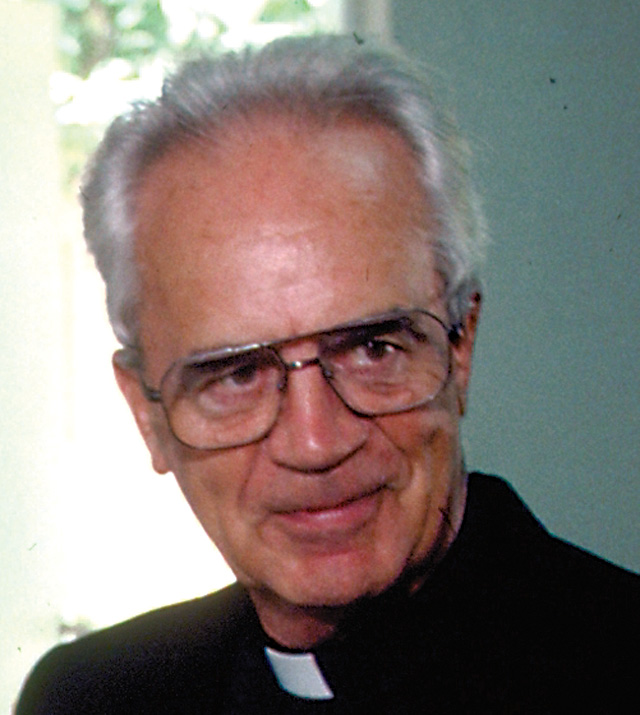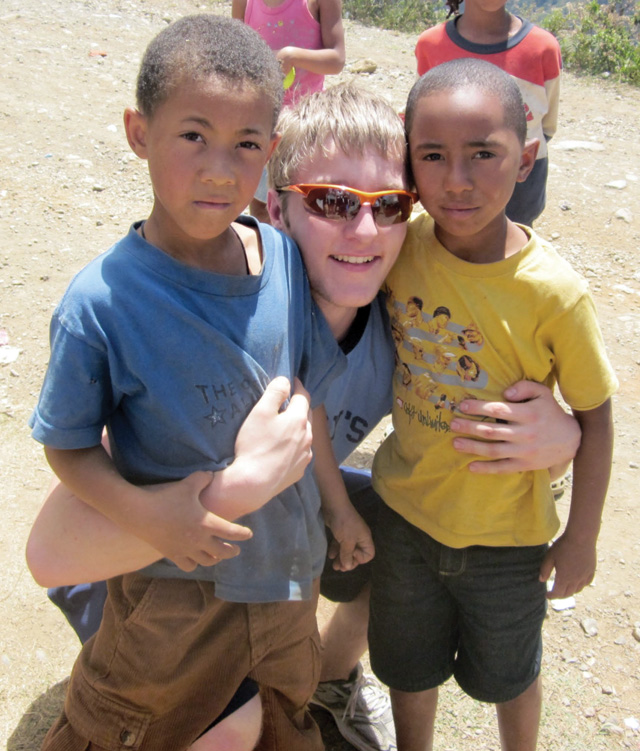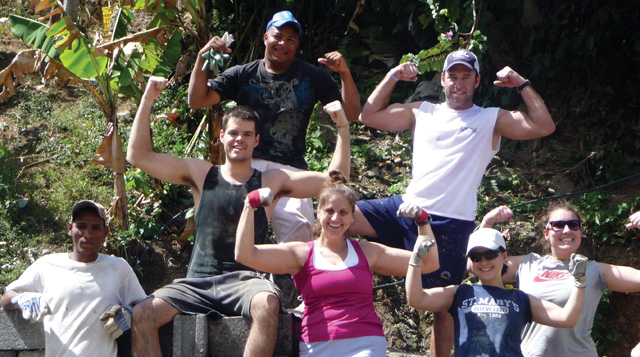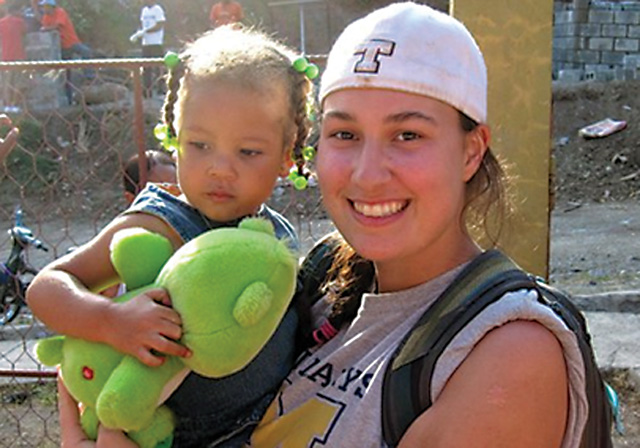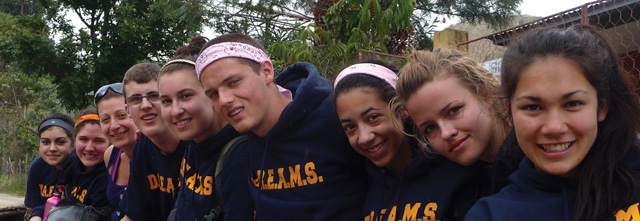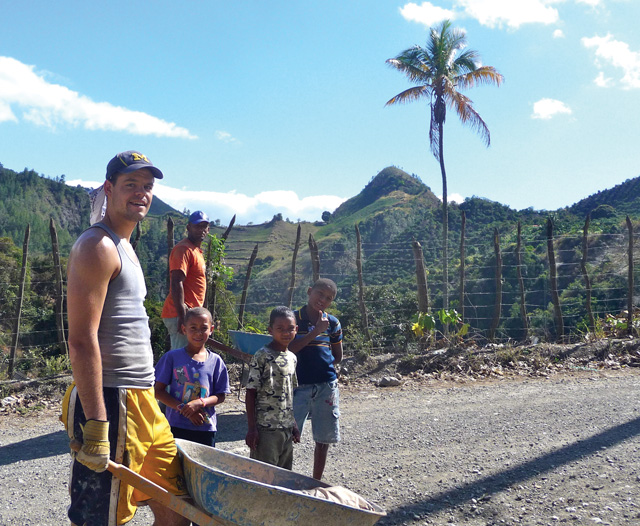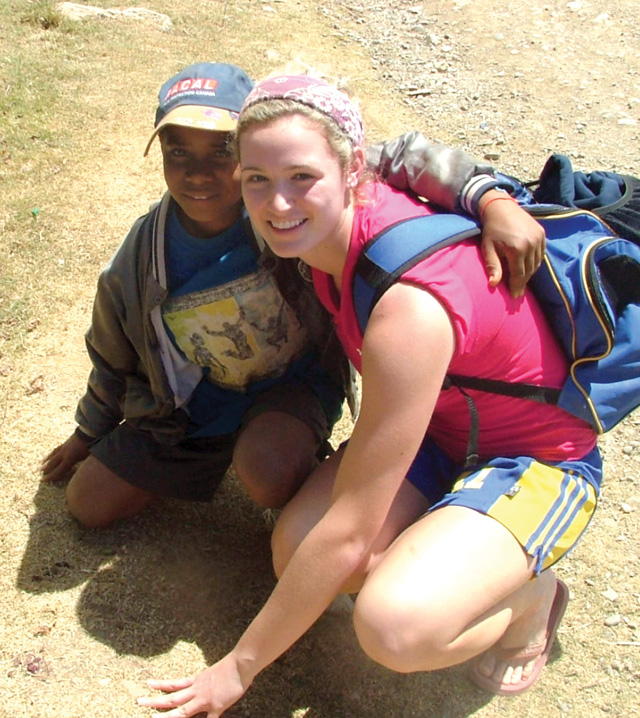D. R. E. A. M. S.
September/October 2011
Return to Table of Contents
Print Article
Every year since 1999, groups of students from St. Mary Catholic Secondary School in Hamilton, Ontario, embark on a journey of discovery through the Dominican Republic Education and Medical Support Program (D.R.E.A.M.S.). Scarboro missioner Fr. Lou Quinn, who served the people of the town of San José de Ocoa and the Surrounding mountain villages for 42 years, helped to facilitate the program in which students assist with projects undertaken by Ocoa’s community development association, ADESJO. Fr. Lou loved the people of Ocoa and said it was an honour to serve them. He is buried in a simple wooden coffin, the kind used by campesinos (farmers), and is interred in a specially built crypt inside Ocoa’s parish church.
It almost didn’t feel real. You see poverty all the time on television and read about it in books, but to experience it firsthand—among the villagers, not as a tourist—opens your eyes. The people on this trip were the experience. People like Miguelito, the foreman at the work site. He knew how to build and was hard working. His hands were proof—rough and dirt caked—with sawdust resting on his arms. And people like Jerling. He and I spent two days breaking up a pile of rocks, then shoveling dirt and rock through the steel mesh of an old bed frame to get a coarse pile of dirt. This could have been an easier task back home, but the people of this community do not have the luxury of big machinery. However, their innovation makes up for a lot.
Even the kids are innovative. I didn’t know a rock could be such a fun toy. We played 10 or 12 different games using just a rock. We skipped stones on the river and played baseball with a rock for the ball. It meant a lot to me when I introduced lacrosse to Argenis and his friends and they picked it up so fast. Everything we gave the kids, they accepted with wide eyes and many thank yous.
Driving away, eyes filled with tears, I couldn’t help but smile knowing that I made a difference in this place. I changed others’ lives, but those others changed my life too. And there was a slight awakening. What more could I have done? Do I need everything I have now? Many of us live our lives based on material possessions, yearning for what we don’t have. The Dominicans live their lives based on faith and on the gifts God has given them, grateful for what they have and for each other.
D.J. Nedelko
The people have very little, yet they are willing to share the little that they have. People say that God works in mysterious ways. In the Dominican Republic God was not mysterious. I found God in the people I travelled with as well as those whom I met on the trip.
Colleen Daly
My favourite memory and statement, which, to me, gives life to the D.R.E.A.M.S. program, came from the man whose house we helped paint. As we finished his house he said, “Fr. Lou is not dead; he is alive and with us in every group of students that comes down.”
Greg Hanta
I began this trip excited about the fun I would have and the changes I would help bring about. I came back humbled, for the people of the Dominican Republic have given me more than I can ever hope to return in this lifetime. These wonderful people have shown me what it truly means to live the Gospel preaching, “Love your neighbour as yourself.” I wept in the beginning for the poverty and hunger that could be seen in a child’s eyes; now I weep for us, for our world does not seem to comprehend what it means to be truly grateful, to truly love life and others.
I can no longer be a bystander. I plan on eventually going back and assisting the people as a nurse some day. I went to the Dominican Republic as a student, with my friends and peers, intending to leave everything behind. Yet I came back so much richer. Thank you for this life changing journey. D.R.E.A.M.S., you are forever imprinted on my memory. Catherine McCann
The whole community came out to help with the building of the house, the men on the work site and the women preparing wonderful meals for us. And after a long day of work, the best prescription for sore and tired bodies was a fiesta! Every night after dusk, the music would start to play, slowly becoming louder and louder. Boy, do the Dominicans know how to dance; it was hard to keep up with all the skilful moves. I was so thankful for my grade nine gym dance class where we learned the salsa.
Alix Figliola
I will never forget the women crying as they saw us off. At that point, I knew that we did help them. They do appreciate our help, even if we are not the best workers in the world. They are very grateful people, never taking anything for granted. I believe every little contribution to help improve their quality of life helped them. The money we used for medical supplies, clothes, undergarments, toiletries, tools and work supplies for the houses were many of the contributions. I feel our presence was also a contribution.
Chiarina Crawford
Before I went on the trip I knew I was very fortunate to live in a country where so much is available to me, but after traveling down there it became even clearer just how fortunate I am. D.R.E.A.M.S. was life-changing.
Every day the whole community came to the work site to help with building the house. Even if they weren’t there to perform physical work, they were there to support. We did a lot of work. Digging, lifting, moving, digging some more, mixing, and finally more digging! The Dominican people called me El fuerte (the strong one). At the end of the work day, we would have our group reflections. These reflections were amazing because we could talk about the day’s events and really just say what was on our minds. After that we went dancing most of the nights. Wow, do the Dominicans like to dance. We learned the meringue and the bachata.
Throughout the trip I became close to so many of the people there. You worked, laughed and danced with them all week; it was extremely hard to leave. Every second on the trip was filled with laughter, tears, sweat and happiness.
Nic Yantzi
We spent a lot of time building the foundation for a home. However, when I reflect on my experiences, I understand that I was in fact building the foundation for a better outlook on life—learning that life is not about having more or better possessions. Instead, I’ve learned that life is about relationships and sharing what you have within a community.
The warmth of the sun’s rays. The view from the top of the mountain. The deafening noise of mopeds driving by. The chickens. The squeaking beds. Fearing for your life riding in the back of a truck on an 80-degree incline. Singing. Laughing before bed. The smiles on every villager’s face. The laughs of the children. Spanish.
Ahh, the Dominican Republic...
As we pulled away, there was a house on a hill a couple minutes down the road. We were waving goodbye and a woman was waving back. Then she lifted her arms towards the sky in a form of praise, as though she was thanking God for us. It was one of the most beautiful things I have experienced.
Doriana Homerski
I remember our first baseball game with the Dominican children. At home I am both a player and an umpire in Little League Baseball. I have seen American and Canadian teams play. I have played with and against American and Canadian teams. And never once in nine years of baseball have I seen anyone hit a ball more than 200 feet with an aluminum bat that is the length of his torso and legs combined. It came from a kid who is in the equivalent of grade four. It wasn’t just a matter of skill that impressed me, it was their ability to remove all of their worries and poverty and simply have fun.
Even though they had little to nothing, they could share a smile, a laugh, or a game of baseball at any time, any day. There was never any complaint about the rough rocks under their bare feet, no complaints that they were hungry or thirsty... the wealth of the people in this village came from each other.
I don’t remember the experience by the food we ate or the places we slept. It was the amazing people that we met—their perpetual happiness and their beautiful souls. Sure, we slept in a hut and walked 20 minutes up steep and never-ending hills daily. But we didn’t stop smiling. Not once did we complain. It’s just as the Bible says: happy are the poor, happy are the meek, and happy are those who hunger for righteousness.
Ryan Correa
Return to Table of Contents
Print Article
